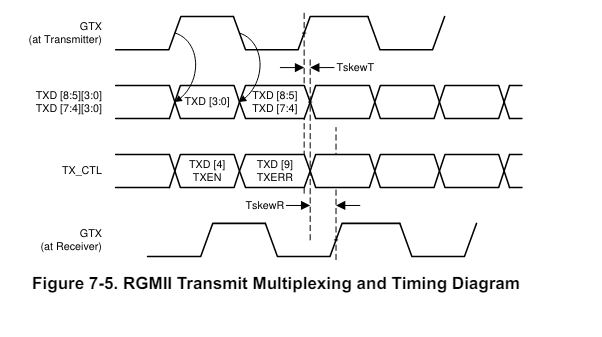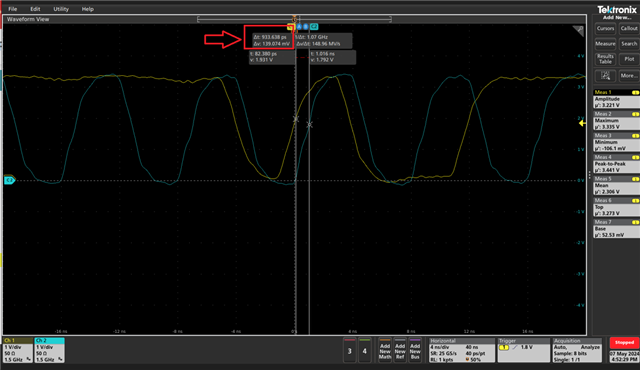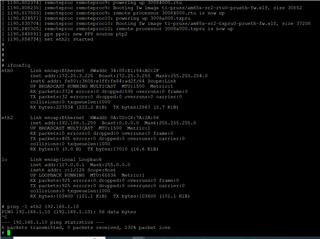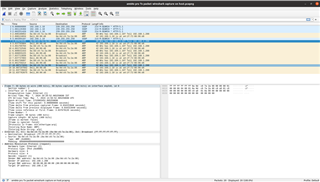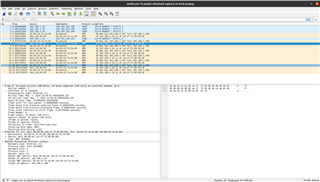Other Parts Discussed in Thread: DP83869, TMDS64EVM, SK-AM64B, AM6442
My company has designed a custom board based on the SKAM64B. We have a pru-icssg ethernet interface on the board. The interface has been enabled on the board and has been set up, but we are not able to ping the computer that is connected to the port. The 2 cpsw ports on our board work normally.
We are using a build based on SDK version 08.06.00.x
These are the sections of the dts pertaining to the ethernet ports:
/ {
compatible = "ti,am642-sk", "ti,am642";
model = "American Energy Storage Innovations am642-aesi";
icssg1_eth: icssg1-eth {
compatible = "ti,am642-icssg-prueth";
pinctrl-names = "default";
pinctrl-0 = <&prg1_rgmii1_pins>;
sram = <&oc_sram>;
ti,prus = <&pru1_0>, <&rtu1_0>, <&tx_pru1_0>, <&pru1_1>, <&rtu1_1>, <&tx_pru1_1>;
firmware-name = "ti-pruss/am65x-sr2-pru0-prueth-fw.elf",
"ti-pruss/am65x-sr2-rtu0-prueth-fw.elf",
"ti-pruss/am65x-sr2-txpru0-prueth-fw.elf",
"ti-pruss/am65x-sr2-pru1-prueth-fw.elf",
"ti-pruss/am65x-sr2-rtu1-prueth-fw.elf",
"ti-pruss/am65x-sr2-txpru1-prueth-fw.elf";
ti,pruss-gp-mux-sel = <2>, /* MII mode */
<2>,
<2>,
<2>, /* MII mode */
<2>,
<2>;
mii-g-rt = <&icssg1_mii_g_rt>;
mii-rt = <&icssg1_mii_rt>;
iep = <&icssg1_iep0>, <&icssg1_iep1>;
interrupt-parent = <&icssg1_intc>;
interrupts = <24 0 2>, <25 1 3>;
interrupt-names = "tx_ts0", "tx_ts1";
dma-coherent;
dmas = <&main_pktdma 0xc200 15>, /* egress slice 0 */
<&main_pktdma 0xc201 15>, /* egress slice 0 */
<&main_pktdma 0xc202 15>, /* egress slice 0 */
<&main_pktdma 0xc203 15>, /* egress slice 0 */
<&main_pktdma 0xc204 15>, /* egress slice 1 */
<&main_pktdma 0xc205 15>, /* egress slice 1 */
<&main_pktdma 0xc206 15>, /* egress slice 1 */
<&main_pktdma 0xc207 15>, /* egress slice 1 */
<&main_pktdma 0x4200 15>, /* ingress slice 0 */
<&main_pktdma 0x4201 15>, /* ingress slice 1 */
<&main_pktdma 0x4202 0>, /* mgmnt rsp slice 0 */
<&main_pktdma 0x4203 0>; /* mgmnt rsp slice 1 */
dma-names = "tx0-0", "tx0-1", "tx0-2", "tx0-3",
"tx1-0", "tx1-1", "tx1-2", "tx1-3",
"rx0", "rx1",
"rxmgm0", "rxmgm1";
icssg1_emac0: ethernet-mii0 {
phy-handle = <&icssg1_phy1>;
phy-mode = "rgmii-rxid";
syscon-rgmii-delay = <&main_conf 0x4110>;
/* Filled in by bootloader */
local-mac-address = [00 00 00 00 00 00];
};
icssg1_emac1: ethernet-mii1 {
syscon-rgmii-delay = <&main_conf 0x4114>;
/* Filled in by bootloader */
local-mac-address = [00 00 00 00 00 00];
status = "disabled";
};
};
};
&main_pmx0 {
cpsw_mdio0_pins: cpsw-mdio0-pins {
pinctrl-single,pins = <
AM64X_IOPAD(0x01fc, PIN_OUTPUT, 4) /* (R2) PRG0_PRU1_GPO19.MDIO0_MDC */
AM64X_IOPAD(0x01f8, PIN_INPUT, 4) /* (P5) PRG0_PRU1_GPO18.MDIO0_MDIO */
>;
};
cpsw_rgmii1_pins: cpsw-rgmii1-pins {
pinctrl-single,pins = <
AM64X_IOPAD(0x011c, PIN_INPUT, 4) /* (AA13) PRG1_PRU1_GPO5.RGMII1_RD0 */
AM64X_IOPAD(0x0128, PIN_INPUT, 4) /* (U12) PRG1_PRU1_GPO8.RGMII1_RD1 */
AM64X_IOPAD(0x0150, PIN_INPUT, 4) /* (Y13) PRG1_PRU1_GPO18.RGMII1_RD2 */
AM64X_IOPAD(0x0154, PIN_INPUT, 4) /* (V12) PRG1_PRU1_GPO19.RGMII1_RD3 */
AM64X_IOPAD(0x00d8, PIN_INPUT, 4) /* (W13) PRG1_PRU0_GPO8.RGMII1_RXC */
AM64X_IOPAD(0x00cc, PIN_INPUT, 4) /* (V13) PRG1_PRU0_GPO5.RGMII1_RX_CTL */
AM64X_IOPAD(0x0124, PIN_OUTPUT, 4) /* (V15) PRG1_PRU1_GPO7.RGMII1_TD0 */
AM64X_IOPAD(0x012c, PIN_OUTPUT, 4) /* (V14) PRG1_PRU1_GPO9.RGMII1_TD1 */
AM64X_IOPAD(0x0130, PIN_OUTPUT, 4) /* (W14) PRG1_PRU1_GPO10.RGMII1_TD2 */
AM64X_IOPAD(0x014c, PIN_OUTPUT, 4) /* (AA14) PRG1_PRU1_GPO17.RGMII1_TD3 */
AM64X_IOPAD(0x00e0, PIN_OUTPUT, 4) /* (U14) PRG1_PRU0_GPO10.RGMII1_TXC */
AM64X_IOPAD(0x00dc, PIN_OUTPUT, 4) /* (U15) PRG1_PRU0_GPO9.RGMII1_TX_CTL */
>;
};
cpsw_rgmii2_pins: cpsw-rgmii2-pins {
pinctrl-single,pins = <
AM64X_IOPAD(0x0108, PIN_INPUT, 4) /* (W11) PRG1_PRU1_GPO0.RGMII2_RD0 */
AM64X_IOPAD(0x010c, PIN_INPUT, 4) /* (V11) PRG1_PRU1_GPO1.RGMII2_RD1 */
AM64X_IOPAD(0x0110, PIN_INPUT, 4) /* (AA12) PRG1_PRU1_GPO2.RGMII2_RD2 */
AM64X_IOPAD(0x0114, PIN_INPUT, 4) /* (Y12) PRG1_PRU1_GPO3.RGMII2_RD3 */
AM64X_IOPAD(0x0120, PIN_INPUT, 4) /* (U11) PRG1_PRU1_GPO6.RGMII2_RXC */
AM64X_IOPAD(0x0118, PIN_INPUT, 4) /* (W12) PRG1_PRU1_GPO4.RGMII2_RX_CTL */
AM64X_IOPAD(0x0134, PIN_OUTPUT, 4) /* (AA10) PRG1_PRU1_GPO11.RGMII2_TD0 */
AM64X_IOPAD(0x0138, PIN_OUTPUT, 4) /* (V10) PRG1_PRU1_GPO12.RGMII2_TD1 */
AM64X_IOPAD(0x013c, PIN_OUTPUT, 4) /* (U10) PRG1_PRU1_GPO13.RGMII2_TD2 */
AM64X_IOPAD(0x0140, PIN_OUTPUT, 4) /* (AA11) PRG1_PRU1_GPO14.RGMII2_TD3 */
AM64X_IOPAD(0x0148, PIN_OUTPUT, 4) /* (Y10) PRG1_PRU1_GPO16.RGMII2_TXC */
AM64X_IOPAD(0x0144, PIN_OUTPUT, 4) /* (Y11) PRG1_PRU1_GPO15.RGMII2_TX_CTL */
>;
};
prg1_mdio0_pins: prg1-mdio0-pins {
pinctrl-single,pins = <
AM64X_IOPAD(0x015c, PIN_OUTPUT, 0) /* (Y6) PRG1_MDIO0_MDC */
AM64X_IOPAD(0x0158, PIN_INPUT, 0) /* (AA6) PRG1_MDIO0_MDIO */
>;
};
prg1_rgmii1_pins: prg1-rgmii1-pins {
pinctrl-single,pins = <
AM64X_IOPAD(0x00b8, PIN_INPUT, 2) /* (Y7) PRG1_PRU0_GPO0.PRG1_RGMII1_RD0 */
AM64X_IOPAD(0x00bc, PIN_INPUT, 2) /* (U8) PRG1_PRU0_GPO1.PRG1_RGMII1_RD1 */
AM64X_IOPAD(0x00c0, PIN_INPUT, 2) /* (W8) PRG1_PRU0_GPO2.PRG1_RGMII1_RD2 */
AM64X_IOPAD(0x00c4, PIN_INPUT, 2) /* (V8) PRG1_PRU0_GPO3.PRG1_RGMII1_RD3 */
AM64X_IOPAD(0x00d0, PIN_INPUT, 2) /* (AA7) PRG1_PRU0_GPO6.PRG1_RGMII1_RXC */
AM64X_IOPAD(0x00c8, PIN_INPUT, 2) /* (Y8) PRG1_PRU0_GPO4.PRG1_RGMII1_RX_CTL */
AM64X_IOPAD(0x00e4, PIN_OUTPUT, 2) /* (AA8) PRG1_PRU0_GPO11.PRG1_RGMII1_TD0 */
AM64X_IOPAD(0x00e8, PIN_OUTPUT, 2) /* (U9) PRG1_PRU0_GPO12.PRG1_RGMII1_TD1 */
AM64X_IOPAD(0x00ec, PIN_OUTPUT, 2) /* (W9) PRG1_PRU0_GPO13.PRG1_RGMII1_TD2 */
AM64X_IOPAD(0x00f0, PIN_OUTPUT, 2) /* (AA9) PRG1_PRU0_GPO14.PRG1_RGMII1_TD3 */
AM64X_IOPAD(0x00f8, PIN_OUTPUT, 2) /* (V9) PRG1_PRU0_GPO16.PRG1_RGMII1_TXC */
AM64X_IOPAD(0x00f4, PIN_OUTPUT, 2) /* (Y9) PRG1_PRU0_GPO15.PRG1_RGMII1_TX_CTL */
>;
};
prg1_iep0_pins: prg1-iep0-pins {
pinctrl-single,pins = <
AM64X_IOPAD(0x0104, PIN_OUTPUT, 2) /* (W7) PRG0_PRU0_GPO17.PRG0_IEP0_EDC_SYNC_OUT1 */
>;
};
};
&cpsw3g {
pinctrl-names = "default";
pinctrl-0 = <&cpsw_mdio0_pins
&cpsw_rgmii1_pins
&cpsw_rgmii2_pins>;
cpts@3d000 {
ti,pps = <7 1>;
};
};
&cpsw_port1 {
phy-mode = "rgmii-rxid";
phy-handle = <&cpsw3g_phy0>;
};
&cpsw_port2 {
phy-mode = "rgmii-rxid";
phy-handle = <&cpsw3g_phy1>;
};
&cpsw3g_mdio {
cpsw3g_phy0: ethernet-phy@0 {
reg = <0>;
ti,rx-internal-delay = <DP83867_RGMIIDCTL_2_00_NS>;
ti,fifo-depth = <DP83867_PHYCR_FIFO_DEPTH_4_B_NIB>;
};
cpsw3g_phy1: ethernet-phy@1 {
reg = <1>;
ti,rx-internal-delay = <DP83867_RGMIIDCTL_2_00_NS>;
ti,fifo-depth = <DP83867_PHYCR_FIFO_DEPTH_4_B_NIB>;
};
};
&icssg0_mdio {
status = "disabled";
};
&icssg1_mdio {
status = "okay";
pinctrl-names = "default";
pinctrl-0 = <&prg1_mdio0_pins>;
icssg1_phy1: ethernet-phy@2 {
reg = <0x2>;
tx-internal-delay-ps = <250>;
rx-internal-delay-ps = <2000>;
ti,rx-internal-delay = <DP83867_RGMIIDCTL_2_00_NS>;
};
};
&icssg1_iep0 {
pinctrl-names = "default";
pinctrl-0 = <&prg1_iep0_pins>;
};
Here is a log:
Starting kernel ...
[ 0.000000] Booting Linux on physical CPU 0x0000000000 [0x410fd034]
[ 0.000000] Linux version 5.10.168 (dan@Workstation1) (aarch64-abs-linux-gnu-gcc.br_real (Buildroot -g612e866) 10.4.0, GNU ld (GNU Binutils) 2.37) #1 SMP PREEMPT Thu Mar 21 16:42:59 CDT 2024
[ 0.000000] Machine model: American Energy Storage Innovations am642-aesi
[ 0.000000] earlycon: ns16550a0 at MMIO32 0x0000000002800000 (options '')
[ 0.000000] printk: bootconsole [ns16550a0] enabled
[ 0.000000] efi: UEFI not found.
[ 0.000000] OF: reserved mem: initialized node sram-shared-memory, compatible id dma-heap-carveout
[ 0.000000] Reserved memory: created DMA memory pool at 0x00000000a0000000, size 1 MiB
[ 0.000000] OF: reserved mem: initialized node r5f-dma-memory@a0000000, compatible id shared-dma-pool
[ 0.000000] Reserved memory: created DMA memory pool at 0x00000000a0100000, size 15 MiB
[ 0.000000] OF: reserved mem: initialized node r5f-memory@a0100000, compatible id shared-dma-pool
[ 0.000000] Reserved memory: created DMA memory pool at 0x00000000a1000000, size 1 MiB
[ 0.000000] OF: reserved mem: initialized node r5f-dma-memory@a1000000, compatible id shared-dma-pool
[ 0.000000] Reserved memory: created DMA memory pool at 0x00000000a1100000, size 15 MiB
[ 0.000000] OF: reserved mem: initialized node r5f-memory@a1100000, compatible id shared-dma-pool
[ 0.000000] OF: reserved mem: initialized node freertos-shared-memory, compatible id dma-heap-carveout
[ 0.000000] Reserved memory: created DMA memory pool at 0x00000000a4000000, size 1 MiB
[ 0.000000] OF: reserved mem: initialized node m4f-dma-memory@a4000000, compatible id shared-dma-pool
[ 0.000000] Reserved memory: created DMA memory pool at 0x00000000a4100000, size 15 MiB
[ 0.000000] OF: reserved mem: initialized node m4f-memory@a4100000, compatible id shared-dma-pool
[ 0.000000] Zone ranges:
[ 0.000000] DMA [mem 0x0000000080000000-0x00000000ffffffff]
[ 0.000000] DMA32 empty
[ 0.000000] Normal empty
[ 0.000000] Movable zone start for each node
[ 0.000000] Early memory node ranges
[ 0.000000] node 0: [mem 0x0000000080000000-0x000000009e7fffff]
[ 0.000000] node 0: [mem 0x000000009e800000-0x00000000a20fffff]
[ 0.000000] node 0: [mem 0x00000000a2100000-0x00000000a3ffffff]
[ 0.000000] node 0: [mem 0x00000000a4000000-0x00000000a57fffff]
[ 0.000000] node 0: [mem 0x00000000a5800000-0x00000000ffffffff]
[ 0.000000] Initmem setup node 0 [mem 0x0000000080000000-0x00000000ffffffff]
[ 0.000000] cma: Reserved 512 MiB at 0x00000000dd000000
[ 0.000000] psci: probing for conduit method from DT.
[ 0.000000] psci: PSCIv1.1 detected in firmware.
[ 0.000000] psci: Using standard PSCI v0.2 function IDs
[ 0.000000] psci: Trusted OS migration not required
[ 0.000000] psci: SMC Calling Convention v1.2
[ 0.000000] percpu: Embedded 22 pages/cpu s50072 r8192 d31848 u90112
[ 0.000000] Detected VIPT I-cache on CPU0
[ 0.000000] CPU features: detected: ARM erratum 845719
[ 0.000000] CPU features: detected: GIC system register CPU interface
[ 0.000000] Built 1 zonelists, mobility grouping on. Total pages: 516096
[ 0.000000] Kernel command line: console=ttyS2,115200n8 earlycon=ns16550a,mmio32,0x02800000 mtdparts=fc40000.spi.0:1m(ospi.tiboot3),2m(ospi.tispl),4m(ospi.u-boot),256k(ospi.env),256k(ospi.env.backup),256k(ospi.terastor),256k(ospi.terastor.backup),57088k@8m(ospi.rootfs),256k(ospi.phypattern);omap2-nand.0:2m(NAND.tiboot3),2m(NAND.tispl),2m(NAND.tiboot3.backup),4m(NAND.u-boot),256k(NAND.u-boot-env),256k(NAND.u-boot-env.backup),-(NAND.file-system) root=PARTUUID=75a97c78-02 ro rootfstype=ext4 rootwait
[ 0.000000] Dentry cache hash table entries: 262144 (order: 9, 2097152 bytes, linear)
[ 0.000000] Inode-cache hash table entries: 131072 (order: 8, 1048576 bytes, linear)
[ 0.000000] mem auto-init: stack:off, heap alloc:off, heap free:off
[ 0.000000] Memory: 1430732K/2097152K available (11136K kernel code, 1156K rwdata, 4188K rodata, 1792K init, 433K bss, 142132K reserved, 524288K cma-reserved)
[ 0.000000] SLUB: HWalign=64, Order=0-3, MinObjects=0, CPUs=2, Nodes=1
[ 0.000000] rcu: Preemptible hierarchical RCU implementation.
[ 0.000000] rcu: RCU event tracing is enabled.
[ 0.000000] rcu: RCU restricting CPUs from NR_CPUS=256 to nr_cpu_ids=2.
[ 0.000000] Trampoline variant of Tasks RCU enabled.
[ 0.000000] rcu: RCU calculated value of scheduler-enlistment delay is 25 jiffies.
[ 0.000000] rcu: Adjusting geometry for rcu_fanout_leaf=16, nr_cpu_ids=2
[ 0.000000] NR_IRQS: 64, nr_irqs: 64, preallocated irqs: 0
[ 0.000000] GICv3: GIC: Using split EOI/Deactivate mode
[ 0.000000] GICv3: 256 SPIs implemented
[ 0.000000] GICv3: 0 Extended SPIs implemented
[ 0.000000] GICv3: Distributor has no Range Selector support
[ 0.000000] GICv3: 16 PPIs implemented
[ 0.000000] GICv3: CPU0: found redistributor 0 region 0:0x0000000001840000
[ 0.000000] ITS [mem 0x01820000-0x0182ffff]
[ 0.000000] GIC: enabling workaround for ITS: Socionext Synquacer pre-ITS
[ 0.000000] ITS@0x0000000001820000: Devices Table too large, reduce ids 20->19
[ 0.000000] ITS@0x0000000001820000: allocated 524288 Devices @80800000 (flat, esz 8, psz 64K, shr 0)
[ 0.000000] ITS: using cache flushing for cmd queue
[ 0.000000] GICv3: using LPI property table @0x0000000080030000
[ 0.000000] GIC: using cache flushing for LPI property table
[ 0.000000] GICv3: CPU0: using allocated LPI pending table @0x0000000080040000
[ 0.000000] arch_timer: cp15 timer(s) running at 200.00MHz (phys).
[ 0.000000] clocksource: arch_sys_counter: mask: 0xffffffffffffff max_cycles: 0x2e2049d3e8, max_idle_ns: 440795210634 ns
[ 0.000006] sched_clock: 56 bits at 200MHz, resolution 5ns, wraps every 4398046511102ns
[ 0.008643] Console: colour dummy device 80x25
[ 0.013246] Calibrating delay loop (skipped), value calculated using timer frequency.. 400.00 BogoMIPS (lpj=800000)
[ 0.023921] pid_max: default: 32768 minimum: 301
[ 0.028750] LSM: Security Framework initializing
[ 0.033543] Mount-cache hash table entries: 4096 (order: 3, 32768 bytes, linear)
[ 0.041118] Mountpoint-cache hash table entries: 4096 (order: 3, 32768 bytes, linear)
[ 0.051059] rcu: Hierarchical SRCU implementation.
[ 0.056299] Platform MSI: msi-controller@1820000 domain created
[ 0.062776] PCI/MSI: /bus@f4000/interrupt-controller@1800000/msi-controller@1820000 domain created
[ 0.072153] EFI services will not be available.
[ 0.077137] smp: Bringing up secondary CPUs ...
I/TC: Secondary CPU 1 initializing
I/TC: Secondary CPU 1 switching to normal world boot
[ 0.090780] Detected VIPT I-cache on CPU1
[ 0.090827] GICv3: CPU1: found redistributor 1 region 0:0x0000000001860000
[ 0.090844] GICv3: CPU1: using allocated LPI pending table @0x0000000080050000
[ 0.090913] CPU1: Booted secondary processor 0x0000000001 [0x410fd034]
[ 0.091049] smp: Brought up 1 node, 2 CPUs
[ 0.120428] SMP: Total of 2 processors activated.
[ 0.125240] CPU features: detected: 32-bit EL0 Support
[ 0.130513] CPU features: detected: CRC32 instructions
[ 0.143834] CPU: All CPU(s) started at EL2
[ 0.148039] alternatives: patching kernel code
[ 0.153832] devtmpfs: initialized
[ 0.166496] KASLR disabled due to lack of seed
[ 0.171299] clocksource: jiffies: mask: 0xffffffff max_cycles: 0xffffffff, max_idle_ns: 7645041785100000 ns
[ 0.181273] futex hash table entries: 512 (order: 3, 32768 bytes, linear)
[ 0.207134] pinctrl core: initialized pinctrl subsystem
[ 0.213212] DMI not present or invalid.
[ 0.217889] NET: Registered protocol family 16
[ 0.224308] DMA: preallocated 256 KiB GFP_KERNEL pool for atomic allocations
[ 0.231721] DMA: preallocated 256 KiB GFP_KERNEL|GFP_DMA pool for atomic allocations
[ 0.239829] DMA: preallocated 256 KiB GFP_KERNEL|GFP_DMA32 pool for atomic allocations
[ 0.248589] thermal_sys: Registered thermal governor 'step_wise'
[ 0.248596] thermal_sys: Registered thermal governor 'power_allocator'
[ 0.255410] hw-breakpoint: found 6 breakpoint and 4 watchpoint registers.
[ 0.269141] ASID allocator initialised with 65536 entries
[ 0.302924] HugeTLB registered 1.00 GiB page size, pre-allocated 0 pages
[ 0.309810] HugeTLB registered 32.0 MiB page size, pre-allocated 0 pages
[ 0.316658] HugeTLB registered 2.00 MiB page size, pre-allocated 0 pages
[ 0.323505] HugeTLB registered 64.0 KiB page size, pre-allocated 0 pages
[ 0.331788] cryptd: max_cpu_qlen set to 1000
[ 0.339853] k3-chipinfo 43000014.chipid: Family:AM64X rev:SR2.0 JTAGID[0x1bb3802f] Detected
[ 0.349070] vcc_3v3_sys: supplied by vusb_main5v0
[ 0.354530] vdd_mmc1: supplied by vcc_3v3_sys
[ 0.360370] iommu: Default domain type: Translated
[ 0.365855] SCSI subsystem initialized
[ 0.370322] mc: Linux media interface: v0.10
[ 0.374723] videodev: Linux video capture interface: v2.00
[ 0.380422] pps_core: LinuxPPS API ver. 1 registered
[ 0.385501] pps_core: Software ver. 5.3.6 - Copyright 2005-2007 Rodolfo Giometti <giometti@linux.it>
[ 0.394845] PTP clock support registered
[ 0.398885] EDAC MC: Ver: 3.0.0
[ 0.402998] omap-mailbox 29020000.mailbox: omap mailbox rev 0x66fc9100
[ 0.409898] omap-mailbox 29060000.mailbox: omap mailbox rev 0x66fc9100
[ 0.417389] FPGA manager framework
[ 0.420977] Advanced Linux Sound Architecture Driver Initialized.
[ 0.428322] clocksource: Switched to clocksource arch_sys_counter
[ 0.434846] VFS: Disk quotas dquot_6.6.0
[ 0.438923] VFS: Dquot-cache hash table entries: 512 (order 0, 4096 bytes)
[ 0.452248] Carveout Heap: Exported 1 MiB at 0x00000000700e0000
[ 0.458451] Carveout Heap: Exported 1 MiB at 0x00000000a2000000
[ 0.464664] NET: Registered protocol family 2
[ 0.469398] IP idents hash table entries: 32768 (order: 6, 262144 bytes, linear)
[ 0.478505] tcp_listen_portaddr_hash hash table entries: 1024 (order: 2, 16384 bytes, linear)
[ 0.487319] TCP established hash table entries: 16384 (order: 5, 131072 bytes, linear)
[ 0.495540] TCP bind hash table entries: 16384 (order: 6, 262144 bytes, linear)
[ 0.503314] TCP: Hash tables configured (established 16384 bind 16384)
[ 0.510245] UDP hash table entries: 1024 (order: 3, 32768 bytes, linear)
[ 0.517155] UDP-Lite hash table entries: 1024 (order: 3, 32768 bytes, linear)
[ 0.524666] NET: Registered protocol family 1
[ 0.529759] RPC: Registered named UNIX socket transport module.
[ 0.535853] RPC: Registered udp transport module.
[ 0.540697] RPC: Registered tcp transport module.
[ 0.545511] RPC: Registered tcp NFSv4.1 backchannel transport module.
[ 0.552106] PCI: CLS 0 bytes, default 64
[ 0.556896] hw perfevents: enabled with armv8_cortex_a53 PMU driver, 7 counters available
[ 0.569806] Initialise system trusted keyrings
[ 0.574663] workingset: timestamp_bits=46 max_order=19 bucket_order=0
[ 0.585907] squashfs: version 4.0 (2009/01/31) Phillip Lougher
[ 0.592699] NFS: Registering the id_resolver key type
[ 0.597956] Key type id_resolver registered
[ 0.602244] Key type id_legacy registered
[ 0.606420] nfs4filelayout_init: NFSv4 File Layout Driver Registering...
[ 0.613273] nfs4flexfilelayout_init: NFSv4 Flexfile Layout Driver Registering...
[ 0.621083] 9p: Installing v9fs 9p2000 file system support
[ 0.668640] Key type asymmetric registered
[ 0.672847] Asymmetric key parser 'x509' registered
[ 0.677903] Block layer SCSI generic (bsg) driver version 0.4 loaded (major 243)
[ 0.685466] io scheduler mq-deadline registered
[ 0.690100] io scheduler kyber registered
[ 0.696650] pinctrl-single 4084000.pinctrl: 33 pins, size 132
[ 0.703078] pinctrl-single f4000.pinctrl: 180 pins, size 720
[ 0.710050] pinctrl-single a40000.timesync-router: 512 pins, size 2048
[ 0.726366] Serial: 8250/16550 driver, 10 ports, IRQ sharing enabled
[ 0.749267] brd: module loaded
[ 0.760744] loop: module loaded
[ 0.765376] megasas: 07.714.04.00-rc1
[ 0.773590] tun: Universal TUN/TAP device driver, 1.6
[ 0.779502] igbvf: Intel(R) Gigabit Virtual Function Network Driver
[ 0.785924] igbvf: Copyright (c) 2009 - 2012 Intel Corporation.
[ 0.792038] sky2: driver version 1.30
[ 0.797114] VFIO - User Level meta-driver version: 0.3
[ 0.803635] i2c /dev entries driver
[ 0.808754] sdhci: Secure Digital Host Controller Interface driver
[ 0.815090] sdhci: Copyright(c) Pierre Ossman
[ 0.819929] sdhci-pltfm: SDHCI platform and OF driver helper
[ 0.826942] ledtrig-cpu: registered to indicate activity on CPUs
[ 0.833565] SMCCC: SOC_ID: ARCH_SOC_ID not implemented, skipping ....
[ 0.841920] optee: probing for conduit method.
[ 0.846516] optee: revision 3.19 (d9a9e3f4)
[ 0.846887] optee: dynamic shared memory is enabled
[ 0.856688] optee: initialized driver
[ 0.863256] NET: Registered protocol family 17
[ 0.868023] 9pnet: Installing 9P2000 support
[ 0.872480] Key type dns_resolver registered
[ 0.877075] Loading compiled-in X.509 certificates
[ 0.898424] ti-sci 44043000.dmsc: ABI: 3.1 (firmware rev 0x0008 '8.5.3--v08.05.03 (Chill Capybar')
[ 0.957610] omap-gpmc 3b000000.memory-controller: GPMC revision 6.0
[ 0.964103] gpmc_mem_init: disabling cs 0 mapped at 0x0-0x1000000
[ 0.972101] omap_i2c 20000000.i2c: bus 0 rev0.12 at 400 kHz
[ 0.979747] pca953x 1-0020: supply vcc not found, using dummy regulator
[ 0.986734] pca953x 1-0020: using AI
[ 1.014206] pca953x 1-0070: supply vcc not found, using dummy regulator
[ 1.021186] pca953x 1-0070: using no AI
[ 1.025237] pca953x 1-0070: failed writing register
[ 1.030378] pca953x: probe of 1-0070 failed with error -121
[ 1.036277] omap_i2c 20010000.i2c: bus 1 rev0.12 at 400 kHz
[ 1.066006] atmel-ecc: probe of 2-0060 failed with error -121
[ 1.072459] omap_i2c 20020000.i2c: bus 2 rev0.12 at 400 kHz
[ 1.078749] ti-sci-intr bus@f4000:bus@4000000:interrupt-controller1: Interrupt Router 5 domain created
[ 1.088500] ti-sci-intr bus@f4000:interrupt-controller0: Interrupt Router 3 domain created
[ 1.097317] ti-sci-inta 48000000.interrupt-controller: Interrupt Aggregator domain 28 created
[ 1.118134] ti-udma 485c0100.dma-controller: Number of rings: 68
[ 1.126505] ti-udma 485c0100.dma-controller: Channels: 42 (bchan: 18, tchan: 12, rchan: 12)
[ 1.137856] ti-udma 485c0000.dma-controller: Number of rings: 288
[ 1.152768] ti-udma 485c0000.dma-controller: Channels: 56 (tchan: 35, rchan: 21)
[ 1.164389] printk: console [ttyS2] disabled
[ 1.168845] 2800000.serial: ttyS2 at MMIO 0x2800000 (irq = 16, base_baud = 3000000) is a 8250
[ 1.177611] printk: console [ttyS2] enabled
[ 1.177611] printk: console [ttyS2] enabled
[ 1.186054] printk: bootconsole [ns16550a0] disabled
[ 1.186054] printk: bootconsole [ns16550a0] disabled
[ 1.197751] 2840000.serial: ttyS6 at MMIO 0x2840000 (irq = 17, base_baud = 3000000) is a 8250
[ 1.211172] spi-nor spi0.0: s28hs512t (65536 Kbytes)
[ 1.216207] 9 cmdlinepart partitions found on MTD device fc40000.spi.0
[ 1.222730] Creating 9 MTD partitions on "fc40000.spi.0":
[ 1.228127] 0x000000000000-0x000000100000 : "ospi.tiboot3"
[ 1.234975] 0x000000100000-0x000000300000 : "ospi.tispl"
[ 1.241522] 0x000000300000-0x000000700000 : "ospi.u-boot"
[ 1.248158] 0x000000700000-0x000000740000 : "ospi.env"
[ 1.254520] 0x000000740000-0x000000780000 : "ospi.env.backup"
[ 1.261513] 0x000000780000-0x0000007c0000 : "ospi.terastor"
[ 1.268376] 0x0000007c0000-0x000000800000 : "ospi.terastor.backup"
[ 1.275729] 0x000000800000-0x000003fc0000 : "ospi.rootfs"
[ 1.282400] 0x000003fc0000-0x000004000000 : "ospi.phypattern"
[ 1.300877] davinci_mdio 8000f00.mdio: Configuring MDIO in manual mode
[ 1.344332] davinci_mdio 8000f00.mdio: davinci mdio revision 9.7, bus freq 1000000
[ 1.354944] davinci_mdio 8000f00.mdio: phy[0]: device 8000f00.mdio:00, driver TI DP83867
[ 1.363065] davinci_mdio 8000f00.mdio: phy[1]: device 8000f00.mdio:01, driver TI DP83867
[ 1.371279] am65-cpsw-nuss 8000000.ethernet: initializing am65 cpsw nuss version 0x6BA00903, cpsw version 0x6BA80903 Ports: 3 quirks:00000006
[ 1.384167] am65-cpsw-nuss 8000000.ethernet: initialized cpsw ale version 1.4
[ 1.391297] am65-cpsw-nuss 8000000.ethernet: ALE Table size 512
[ 1.398032] pps pps0: new PPS source ptp0
[ 1.402468] am65-cpsw-nuss 8000000.ethernet: CPTS ver 0x4e8a010c, freq:500000000, add_val:1 pps:1
[ 1.413122] am65-cpsw-nuss 8000000.ethernet: set new flow-id-base 16
[ 1.423978] am65-cpts 39000000.cpts: CPTS ver 0x4e8a010c, freq:500000000, add_val:1 pps:0
[ 1.433196] k3-j72xx-soc-thermal b00000.temperature-sensor: invalid resource
[ 1.440326] k3-j72xx-soc-thermal: probe of b00000.temperature-sensor failed with error -22
[ 1.451359] mmc0: CQHCI version 5.10
[ 1.451849] mmc1: CQHCI version 5.10
[ 1.459156] GPIO line 420 (gpio0_63_dir2_b_a_3v3): no hogging state specified, bailing out
[ 1.471621] GPIO line 338 (gpio1_43_2v5_reg_en): no hogging state specified, bailing out
[ 1.479798] GPIO line 338 (gpio1_58_emmc_rst): no hogging state specified, bailing out
[ 1.487717] GPIO line 338 (vsel_sd_switch): no hogging state specified, bailing out
[ 1.496376] mmc0: SDHCI controller on fa10000.mmc [fa10000.mmc] using ADMA 64-bit
[ 1.502090] debugfs: Directory 'pd:114' with parent 'pm_genpd' already present!
[ 1.504378] mmc1: SDHCI controller on fa00000.mmc [fa00000.mmc] using ADMA 64-bit
[ 1.531440] ALSA device list:
[ 1.534441] No soundcards found.
[ 1.538413] Waiting for root device PARTUUID=75a97c78-02...
[ 1.571338] mmc1: new ultra high speed SDR104 SDHC card at address aaaa
[ 1.578856] mmcblk1: mmc1:aaaa SC16G 14.8 GiB
[ 1.589194] mmcblk1: p1 p2 p3 p4
[ 1.609156] mmc0: Command Queue Engine enabled
[ 1.613679] mmc0: new HS200 MMC card at address 0001
[ 1.619504] mmcblk0: mmc0:0001 DG4016 14.7 GiB
[ 1.624397] mmcblk0boot0: mmc0:0001 DG4016 partition 1 4.00 MiB
[ 1.626820] EXT4-fs (mmcblk1p2): mounted filesystem with ordered data mode. Opts: (null)
[ 1.630644] mmcblk0boot1: mmc0:0001 DG4016 partition 2 4.00 MiB
[ 1.638600] VFS: Mounted root (ext4 filesystem) readonly on device 179:2.
[ 1.651304] mmcblk0rpmb: mmc0:0001 DG4016 partition 3 4.00 MiB, chardev (237:0)
[ 1.655114] devtmpfs: mounted
[ 1.663130] Freeing unused kernel memory: 1792K
[ 1.667943] Run /sbin/init as init process
[ 1.747693] EXT4-fs (mmcblk1p2): warning: maximal mount count reached, running e2fsck is recommended
[ 1.761845] EXT4-fs (mmcblk1p2): re-mounted. Opts: (null)
mount: mounting mqueue on /dev/mqueue failed: No such file or directory
Seeding 256 bits and crediting[ 1.838923] random: crng init done
Saving 256 bits of creditable seed for next boot
Starting syslogd: OK
Starting klogd: OK
stty: standard input
Loading modules:[ 1.932692] k3-m4-rproc 5000000.m4fss: assigned reserved memory node m4f-dma-memory@a4000000
[ 1.941646] k3-m4-rproc 5000000.m4fss: configured M4 for remoteproc mode
[ 1.948496] k3-m4-rproc 5000000.m4fss: local reset is deasserted for device
[ 1.955820] remoteproc remoteproc0: 5000000.m4fss is available
ti_k3_m4_remoteproc[ 1.965625] remoteproc remoteproc0: Direct firmware load for am64-mcu-m4f0_0-fw failed with error -2
[ 1.976153] remoteproc remoteproc0: powering up 5000000.m4fss
[ 1.982124] remoteproc remoteproc0: Direct firmware load for am64-mcu-m4f0_0-fw failed with error -2
[ 1.991315] remoteproc remoteproc0: request_firmware failed: -2
[ 1.994842] platform 78000000.r5f: configured R5F for remoteproc mode
[ 2.003839] k3_r5_rproc bus@f4000:r5fss@78000000: split-mode not permitted, force configuring for single-cpu mode
[ 2.014479] platform 78000000.r5f: assigned reserved memory node r5f-dma-memory@a0000000
[ 2.022976] remoteproc remoteproc1: 78000000.r5f is available
[ 2.028974] remoteproc remoteproc1: Direct firmware load for am64-main-r5f0_0-fw failed with error -2
[ 2.038249] remoteproc remoteproc1: powering up 78000000.r5f
[ 2.042101] platform 78400000.r5f: configured R5F for remoteproc mode
[ 2.044024] remoteproc remoteproc1: Direct firmware load for am64-main-r5f0_0-fw failed with error -2
[ 2.050882] k3_r5_rproc bus@f4000:r5fss@78400000: split-mode not permitted, force configuring for single-cpu mode
[ 2.059556] remoteproc remoteproc1: request_firmware failed: -2
[ 2.075914] platform 78400000.r5f: device does not have reserved memory regions, ret = -22
[ 2.084199] k3_r5_rproc bus@f4000:r5fss@78400000: reserved memory init failed, ret = -22
[ 2.092290] remoteproc remoteproc2: releasing 78400000.r5f
[ 2.097786] k3_r5_rproc bus@f4000:r5fss@78400000: k3_r5_cluster_rproc_init failed, ret = -22
[ 2.106778] k3_r5_rproc: probe of bus@f4000:r5fss@78400000 failed with error -22
ti_k3_r5_remoteproc[ 2.151335] davinci_mdio 300b2400.mdio: Configuring MDIO in manual mode
[ 2.196350] davinci_mdio 300b2400.mdio: davinci mdio revision 1.7, bus freq 1000000
[ 2.229068] davinci_mdio 300b2400.mdio: phy[2]: device 300b2400.mdio:02, driver TI DP83867
[ 2.246517] remoteproc remoteproc2: 30034000.pru is available
[ 2.253643] remoteproc remoteproc3: 30004000.rtu is available
[ 2.260711] remoteproc remoteproc4: 3000a000.txpru is available
[ 2.267783] remoteproc remoteproc5: 30038000.pru is available
[ 2.274918] remoteproc remoteproc6: 30006000.rtu is available
[ 2.281904] remoteproc remoteproc7: 3000c000.txpru is available
[ 2.289170] remoteproc remoteproc8: 300b4000.pru is available
[ 2.296144] remoteproc remoteproc9: 30084000.rtu is available
[ 2.303221] remoteproc remoteproc10: 3008a000.txpru is available
[ 2.310344] remoteproc remoteproc11: 300b8000.pru is available
[ 2.317527] remoteproc remoteproc12: 30086000.rtu is available
[ 2.324714] remoteproc remoteproc13: 3008c000.txpru is available
pru_rproc irq-pruss-intc[ 2.371246] icssg-prueth icssg1-eth: port 1: using random MAC addr: 46:da:77:a3:2b:6b
[ 2.383929] TI DP83867 300b2400.mdio:02: attached PHY driver [TI DP83867] (mii_bus:phy_addr=300b2400.mdio:02, irq=POLL)
[ 2.394733] icssg-prueth icssg1-eth: TI PRU ethernet driver initialized: single EMAC mode
icssg-prueth[ 2.431039] usbcore: registered new interface driver usbfs
[ 2.436609] usbcore: registered new interface driver hub
[ 2.442007] usbcore: registered new device driver usb
cdns3 cdns3_ti[ 2.489472] rtc-ds1307 2-0068: registered as rtc0
[ 2.494544] rtc-ds1307 2-0068: setting system clock to 2024-03-22T04:10:14 UTC (1711080614)
rtc_ds1307 usbcore xhci_hcd[ 2.539687] xhci-hcd xhci-hcd.0.auto: xHCI Host Controller
[ 2.545254] xhci-hcd xhci-hcd.0.auto: new USB bus registered, assigned bus number 1
[ 2.553310] xhci-hcd xhci-hcd.0.auto: hcc params 0x200073c9 hci version 0x100 quirks 0x0000002000010010
[ 2.562785] xhci-hcd xhci-hcd.0.auto: irq 571, io mem 0x0f410000
[ 2.568996] xhci-hcd xhci-hcd.0.auto: xHCI Host Controller
[ 2.574504] xhci-hcd xhci-hcd.0.auto: new USB bus registered, assigned bus number 2
[ 2.582186] xhci-hcd xhci-hcd.0.auto: Host supports USB 3.0 SuperSpeed
[ 2.588897] usb usb1: New USB device found, idVendor=1d6b, idProduct=0002, bcdDevice= 5.10
[ 2.597191] usb usb1: New USB device strings: Mfr=3, Product=2, SerialNumber=1
[ 2.604454] usb usb1: Product: xHCI Host Controller
[ 2.609338] usb usb1: Manufacturer: Linux 5.10.168 xhci-hcd
[ 2.614909] usb usb1: SerialNumber: xhci-hcd.0.auto
[ 2.620590] hub 1-0:1.0: USB hub found
[ 2.624392] hub 1-0:1.0: 1 port detected
[ 2.630320] usb usb2: We don't know the algorithms for LPM for this host, disabling LPM.
[ 2.638575] usb usb2: New USB device found, idVendor=1d6b, idProduct=0003, bcdDevice= 5.10
[ 2.646849] usb usb2: New USB device strings: Mfr=3, Product=2, SerialNumber=1
[ 2.654083] usb usb2: Product: xHCI Host Controller
[ 2.658982] usb usb2: Manufacturer: Linux 5.10.168 xhci-hcd
[ 2.664556] usb usb2: SerialNumber: xhci-hcd.0.auto
[ 2.670135] hub 2-0:1.0: USB hub found
[ 2.673939] hub 2-0:1.0: 1 port detected
[ OK ]at_hcd
Running sysctl: OK
Starting network: [ 2.802341] am65-cpsw-nuss 8000000.ethernet eth0: PHY [8000f00.mdio:00] driver [TI DP83867] (irq=POLL)
[ 2.811676] am65-cpsw-nuss 8000000.ethernet eth0: configuring for phy/rgmii-rxid link mode
udhcpc: started, v1.36.1
udhcpc: broadcasting discover
udhcpc: broadcasting discover
udhcpc: broadcasting discover
udhcpc: no lease, forking to background
[ 12.055218] remoteproc remoteproc8: powering up 300b4000.pru
[ 12.065917] remoteproc remoteproc8: Booting fw image ti-pruss/am65x-sr2-pru0-prueth-fw.elf, size 38148
[ 12.075289] remoteproc remoteproc8: unsupported resource 5
[ 12.080817] remoteproc remoteproc8: remote processor 300b4000.pru is now up
[ 12.087814] remoteproc remoteproc9: powering up 30084000.rtu
[ 12.097641] remoteproc remoteproc9: Booting fw image ti-pruss/am65x-sr2-rtu0-prueth-fw.elf, size 30852
[ 12.107011] remoteproc remoteproc9: remote processor 30084000.rtu is now up
[ 12.114083] remoteproc remoteproc10: powering up 3008a000.txpru
[ 12.139405] remoteproc remoteproc10: Booting fw image ti-pruss/am65x-sr2-txpru0-prueth-fw.elf, size 37208
[ 12.149046] remoteproc remoteproc10: remote processor 3008a000.txpru is now up
[ 12.157638] pps pps1: new PPS source ptp2
[ 12.163242] net eth2: started
[ 12.164403] icssg-prueth icssg1-eth eth2: Link is Up - 1Gbps/Full - flow control off
OK
Starting sshd: [ 12.322999] NET: Registered protocol family 10
[ 12.331383] Segment Routing with IPv6
OK
Welcome to American Energy Storage Innovations, Inc.
Build: 0ce104a ()
abs-ems login: root
Password:
# ifconfig
eth0 Link encap:Ethernet HWaddr 34:08:E1:84:AD:2A
UP BROADCAST MULTICAST MTU:1500 Metric:1
RX packets:0 errors:0 dropped:0 overruns:0 frame:0
TX packets:0 errors:0 dropped:0 overruns:0 carrier:0
collisions:0 txqueuelen:1000
RX bytes:0 (0.0 B) TX bytes:0 (0.0 B)
eth2 Link encap:Ethernet HWaddr 46:DA:77:A3:2B:6B
inet addr:169.254.10.102 Bcast:169.254.10.255 Mask:255.255.255.0
inet6 addr: fe80::44da:77ff:fea3:2b6b/64 Scope:Link
UP BROADCAST RUNNING MULTICAST MTU:1500 Metric:1
RX packets:0 errors:0 dropped:0 overruns:0 frame:0
TX packets:12 errors:0 dropped:0 overruns:0 carrier:0
collisions:0 txqueuelen:1000
RX bytes:0 (0.0 B) TX bytes:936 (936.0 B)
lo Link encap:Local Loopback
inet addr:127.0.0.1 Mask:255.0.0.0
inet6 addr: ::1/128 Scope:Host
UP LOOPBACK RUNNING MTU:65536 Metric:1
RX packets:0 errors:0 dropped:0 overruns:0 frame:0
TX packets:0 errors:0 dropped:0 overruns:0 carrier:0
collisions:0 txqueuelen:1000
RX bytes:0 (0.0 B) TX bytes:0 (0.0 B)
# ethtool eth2
Settings for eth2:
Supported ports: [ TP MII ]
Supported link modes: 10baseT/Full
100baseT/Full
1000baseT/Full
Supported pause frame use: No
Supports auto-negotiation: Yes
Supported FEC modes: Not reported
Advertised link modes: 10baseT/Full
100baseT/Full
1000baseT/Full
Advertised pause frame use: No
Advertised auto-negotiation: Yes
Advertised FEC modes: Not reported
Link partner advertised link modes: 10baseT/Half 10baseT/Full
100baseT/Half 100baseT/Full
1000baseT/Full
Link partner advertised pause frame use: Symmetric Receive-only
Link partner advertised auto-negotiation: Yes
Link partner advertised FEC modes: Not reported
Speed: 1000Mb/s
Duplex: Full
Port: Twisted Pair
PHYAD: 2
Transceiver: external
Auto-negotiation: on
MDI-X: Unknown
Current message level: 0x00007fff (32767)
drv probe link timer ifdown ifup rx_err tx_err tx_queued intr tx_done rx_status pktdata hw wol
Link detected: yes
# ip route -n
ip: invalid argument '-n' to 'ip'
# ip route show
default via 169.254.10.1 dev eth2
169.254.10.0/24 dev eth2 scope link src 169.254.10.102
#


